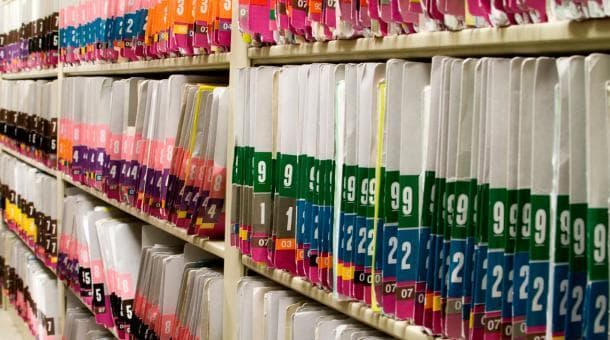Advertisement
Why You Should Demand More Surveillance — Of Your Health Records

Prof. Isaac Kohane is co-director of Harvard Medical School's Center for Biomedical Informatics. As an expert on using computer science to improve medical research and practice, his take on recent revelations about government use of big-data surveillance is, shall we say, provocatively different from most...
By Dr. Isaac Kohane
Guest contributor
For two weeks now, the daily headlines have been filled with descriptions of how our every communication is monitored and mined by our government.
Polls find the public split. Some worry about loss of privacy. Others support surveillance if it helps fight terrorism.
What we haven’t heard from a single pundit in all this Prism pandemonium is, “Actually, there should be more surveillance.”
The vast majority of your health care data remains unused, discarded and ignored.
But that is just what I’m about to argue. And by the time I’m done, I hope I’ll have convinced you to push for more prying eyes on the personal data you think of as most private: your health care records.
Your medical data — the records of your doctors’ visits and operations and drug purchases — is already not as private as you might like to imagine. Dozens of agencies, commercial and governmental, routinely have access to it, ostensibly for the purpose of ensuring efficient and accurate payment.
Yet the vast majority of your health care data remains unused, discarded and ignored. It sits idle when it could be applied today to improve the delivery of health care — including yours — and advance medical science.
A few examples:
Say you’re a woman with a constellation of symptoms that bounce you from emergency care, to psychiatry, to urology for a urinary tract infection. What might your underlying problem be?
Eventually, the health care system would figure out that you’re a victim of domestic abuse. But surveillance of health records could yield that answer faster — and help you sooner. Just by tracking the patterns of emergency-room diagnoses across an entire state, researchers found in a recent study that we could identify domestic abuse an average of two years before the system would normally recognize it.

Or let’s say you have a family history of rheumatoid arthritis or major depression, and you’re worried about your genetic odds. If we can mine your health records along with many others, we can do research that links genes to diseases in about 1 percent of the time and at 1 percent of the cost of typical large clinical trials.
Here’s a story that captures the potential power of health data. Say it’s a few years ago, you’re one of the tens of millions of Americans with diabetes, and you’ve just been prescribed Avandia, a blockbuster drug. It’s also known to carry some risks, but their extent is unclear.
You unleash the health data miners.
This actually happened in 2009. There was concern that Avandia was causing heart attacks, but the data were unclear. So using i2b2, a new platform my team at Harvard developed, we inspected the data from just a couple of large Boston hospitals. We asked: Across all drugs and across all diabetic patients, which drugs are causing more problems?
A research study may actually have saved thousands of lives, just by taking our health data and making it work for us.
It was, frankly, amazing. In just a matter of weeks, we found that Avandia was, in fact, causing a much higher rate of heart attacks than other drugs in the same class. The FDA actually cited our study when it issued a “black box” warning for Avandia. So a research study may actually have saved thousands of lives, just by taking our health data and making it work for us.
Two last examples: Mining the health records of patients with autism has helped clarify sub-types of what should actually be considered, in plural, the “autisms,” each with their own biology and trajectory. Some patients have only seizures. Others have many infections. Still others have mood disorders. Understanding disease sub-types can help lead to distinct therapies tailored to each — and to linking specific genes to specific subtypes.
And finally, a rare disease that tragically kills young women in their prime just as they’re becoming mothers. Peripartum cardiomyopathy is a heart disease of which little was known until investigators at Beth Israel Deaconess Medical Center used i2b2 to find enough patients to investigate it, and they published a groundbreaking study on its cause.
So if keeping a better eye on health care records could help in so many ways, what’s stopping us?
Of course, there are privacy considerations. Not everyone will want their data to be used to advance biomedical care and science, and therefore everyone can and should be enabled to opt out or opt in.
Further, informed consent for such altruistic data-sharing should make it clear what the risks are of accidental or malicious disclosure — but also the current, substantial legal penalties for anyone who abuses your data.
Perhaps a bigger obstacle than privacy is the parochial attitude that treats patient data as belonging to particular institutions, from hospitals to health insurers to vendors of health care information systems.
Even though, as a patient, you have a right to a copy of your data, the reality is that, unlike accessing your personal financial data, if your health data is in one location, for research purposes, it’s only in that one location and you cannot make it work for you.
Nothing will be as powerful as a patient-powered data liberation movement.
So what can you, as a patient, do?
Many things, including furthering the development of guidelines and policies to promote the sharing of our data for research with appropriate security measures.
But nothing will be as powerful as a patient-powered data liberation movement. We have to be clear with our insurance companies, our government, our healthcare systems and the technology companies that serve them: Make our data available, along with that of our fellow citizens, to allow biomedical research questions to be asked that were previously unanswerable.
We may opt in and then opt out of such a data-sharing system, but as long as we are in, we expect that our health care data will be allowed to work for us — and for our fellow human beings.
This program aired on June 21, 2013. The audio for this program is not available.